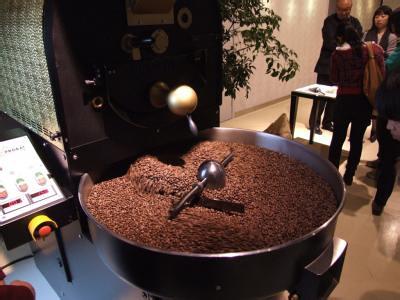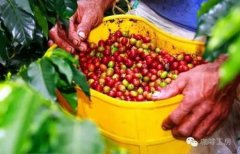The origin and development history and culture of the unique sun-baked Yejia Sheffield Woka coffee beans

It has been a wetland since ancient times, and the ancient saying [yirga] means "settle down], and [cheffe] means [wetland], so [Yega Xuefen] means [let us settle down in this wetland]. It is one of the coffee producing areas with the highest average elevation in Ethiopia.
Yejia snow caffeine is washed with water, but there are also a small number of excellent beans engraved in the sun to enhance the charming fruit aroma and mellow thickness.
Coffee trees are mostly planted in farmers' own backyard or mixed with other crops in the field, the yield per household is not much, it is a typical rural coffee. These mountain villages are foggy, like spring all year round, with a gentle breeze in summer, cool but not hot, rain but not damp, and no cold damage in winter, giving birth to a unique flavor of citrus and flowers.
The so-called 'Yejia Snow Flavor' refers to the strong aromas of jasmine, lemon, peach, almond and tea.
The author's tasting experience has only one sentence: coffee entrance, flowers in full bloom! Just like a flower touches the comfort of taste buds and olfactory cells in the nasal cavity. In addition to the fragrance of the flowers, the delicate mellow thickness (body) is like a silk massage in the mouth.
Traditionally, Yejiaxefin is treated by the oldest sun treatment, but in 1972, Ethiopia introduced Central and South American washing technology to improve its quality, which made its jasmine and citrus fragrance clearer and more refined.
It has become one of the best quality beans in the world, thanks to its exquisite washing technology. Since the 1970s, this area has become the most popular water-washed bean producing area in Egypt.
However, in the past two years, Yejia snow coffee is unusual, frequently launched amazing sun beans, and become a boutique market Deep-Fried Chicken!
The beans are small, neat and round. Ethiopian sun beans are generally G3--G5, but the beans are G2, equal to the grade of washed beans. Although there are still a few defective beans, they are commendable compared to the sun beans of Harald and Sidamo.
The 2015 sun Yega snow caffeine has appeared in the G1 grade, surpassing the G1 washing in terms of quality and sales.
The beans are roasted until they are densely baked and brewed by hand and siphon. When grinding the beans, you can smell the sweet aroma of sun fruit, and there is also the citrus and jasmine fragrance that is the signature of Yega snow caffeine. It tastes like the three-in-one flavor of Harald, Yemeni mocha and Yega snow coffee water-washed beans!
There is a strict standard for collecting red fruits (as a result of coffee trees). Before exposure to coffee fruits, unripe green fruits or defective fruits are removed manually, and damaged or moldy fruits are removed during the sun drying process. after two weeks, the sugar and essence of the flesh and essence seep into the coffee beans, the water content is reduced to 12%, and then scrape the hardened pulp, pectin layer and pods with a planer. Take out the coffee beans and test the density and color of the beans. After eliminating the defective beans, the workers finally picked out the defective beans with the naked eye and screened them layer by layer, resulting in the cleanliness and vulgarity of Yejia snow caffeine sun-dried beans with a strong attractive fruit aroma. Ethiopia is an ancient country with a history of 3000 years of civilization. The Hamite people who immigrated from the southern Arabian Peninsula were the earliest inhabitants.
Monlinique I reigned in 975 BC. The Kingdom of Nubia was established in the 8th century BC. Anchor China Coffee Network
From the 1st century to 976 AD, the Ethiopian Empire, also known as the Kingdom of Aksum, was established in Aksum in the north. 4Murray Christianity was introduced into Ethiopia in the 5th century. From the 12th century to 1270, the Zagvi dynasty was established.
In 1270, the Abyssinian Empire was established. [3] Ethiopian anchor point
The early invasion period of western colonialism
Portugal and the Ottoman Empire invaded one after another in the 16th century. British troops invaded Ethiopia in 1867 and Sudanese Mahdi troops invaded in 1887.
In 1889, Mennelik II became emperor, unified the country, established the capital Addis Ababa, and established the territory of modern Ethiopia. In 1890, Italy invaded, squeezed out British power and declared Ethiopia a "sanctuary". In 1896, Menlinique II led the army to defeat the Italian army in Adua and was forced to recognize the independence of Ethiopia. [1]
During the reign of Emperor Selassie
Haier Selassie was made regent in 1916 and became king in 1928. On November 2, 1930, he was crowned Emperor Haier Selassie I. In 1936, Italy invaded again, occupied Addis Ababa, conquered Ethiopia, and Selassie went into exile in London. The allies defeated Italy in 1941 and Selassie I returned home on May 5 of the same year. Step down after a domestic coup in 1974
Sun Yega Chuefei: light fermented wine, spices
Washed jasmine, lemon or lime acid
[soak the coffee in the cup according to the ratio of 8 grams of powder to 150 milliliters of 93 degrees hot water for 3-4 minutes until the coffee residue shell is formed]
The difference in taste:
Sun Yega Chuefei: the sun is a little complex, light fermented wine, bitter taste will be more intense, taste will be much more rich, honey sweet, cocoa with a hint of spice, body thick and long-lasting.
Water washing Yega Xuefei: the acidity of the water washing treatment will be brighter, like citric acid, the taste is more delicate, citrus flavor is more obvious, and there is some black tea in the latter part.
Same: both will have a sour taste, such as lemon and citrus.
[hand data]
[sun Yega Chuefei]: it is recommended to use 15 grams of powder 89 degrees water temperature, small Fuji grindability 4 V60 filter cup, water powder ratio 1:15, the first water injection 30g, steaming 25s, the second water injection 104g water cut off, the second water injection to 230g water, not the water at the end, the extraction time is about 212s
[washing Yejia Xuefei]: it is recommended to use 15 grams of powder at 92 degrees water temperature, the ratio of water to powder 1 to 15 V60 filter cup, the ratio of water to powder at 1:15, the first water injection 30 g, stewed 28s-30s, the second water injection 110g water cut off, the second water injection to 230g water, not the water in the tail section, and the extraction time is about 2Rd 15s.
In this way, the hands can feel the comfort of Yega Xuefei, just like flowers promote taste buds and olfactory cells in the nasal cavity. The coffee beans after harvest must enter the treatment program immediately, otherwise they will begin to ferment, making the coffee beans have a bad smell. There are two methods of treatment: "solarization" and "washing", which will cause different flavors. Sun-dried beans have a complete natural mellow flavor, gentle aroma and more gum; washing rules have a good mellow taste, high aroma and lively sour taste.
1. Natural solarization (Natural/Dried-in-the-Fruit):
The fruit begins the process of sun drying without treatment after picking. This is the oldest method of treatment in existence. The drying process usually lasts about 4 weeks. The method of handling must be very strict to ensure that the coffee does not lose any flavor. The natural sun method requires the local climate to be extremely dry. In some areas, people use dryers to assist in the drying process of coffee fruit (the hot air of the dryer can speed up the drying process and help people control the degree of drying).
two。 Complete washing method (Washed)
The peel, pulp and mucous membrane are removed by washing and fermentation. farms that use the washing method must build washing ponds and be able to introduce an endless supply of live water. During the treatment, the finished beans are put into the pool and passed back and forth, using the friction of beans and the power of running water to wash the coffee beans until smooth and clean. After washing, at this time, the coffee beans are still wrapped in the pericarp with a moisture content of 50%. They must be dried to reduce the moisture content to 12%, otherwise they will continue to be mellow, moldy and rotten. The better treatment is to use sunlight to dry, although it takes 1-3 weeks, but it has a very good flavor and is very popular.
Important Notice :
前街咖啡 FrontStreet Coffee has moved to new addredd:
FrontStreet Coffee Address: 315,Donghua East Road,GuangZhou
Tel:020 38364473
- Prev

Honey-like sweet aroma of the sun Yega Chefevoca boutique coffee bean flavor, taste and aroma description
Coffee trees are mostly planted in farmers' own backyard or mixed with other crops in the field, the yield per household is not much, it is a typical rural coffee. These mountain villages are foggy, like spring all year round, with a gentle breeze in summer, cool but not hot, rain but not damp, and no cold damage in winter, giving birth to a unique flavor of citrus and flowers. The so-called Yejia chiffon flavor refers to the strong aroma of jasmine and lemon.
- Next

A brief introduction to the market price of fine coffee beans planted in Yega Shifeiwaka
In this way, the hands can feel the comfort of Yega Xuefei, just like flowers promote taste buds and olfactory cells in the nasal cavity. The coffee beans after harvest must enter the treatment program immediately, otherwise they will begin to ferment, making the coffee beans have a bad smell. There are two methods of treatment: solarization and water washing, which will cause different flavors. Sun-dried beans have a complete natural mellow flavor, gentle aroma and
Related
- Detailed explanation of Jadeite planting Land in Panamanian Jadeite Manor introduction to the grading system of Jadeite competitive bidding, Red bid, Green bid and Rose Summer
- Story of Coffee planting in Brenka region of Costa Rica Stonehenge Manor anaerobic heavy honey treatment of flavor mouth
- What's on the barrel of Blue Mountain Coffee beans?
- Can American coffee also pull flowers? How to use hot American style to pull out a good-looking pattern?
- Can you make a cold extract with coffee beans? What is the right proportion for cold-extracted coffee formula?
- Indonesian PWN Gold Mandrine Coffee Origin Features Flavor How to Chong? Mandolin coffee is American.
- A brief introduction to the flavor characteristics of Brazilian yellow bourbon coffee beans
- What is the effect of different water quality on the flavor of cold-extracted coffee? What kind of water is best for brewing coffee?
- Why do you think of Rose Summer whenever you mention Panamanian coffee?
- Introduction to the characteristics of authentic blue mountain coffee bean producing areas? What is the CIB Coffee Authority in Jamaica?

